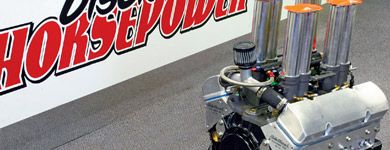
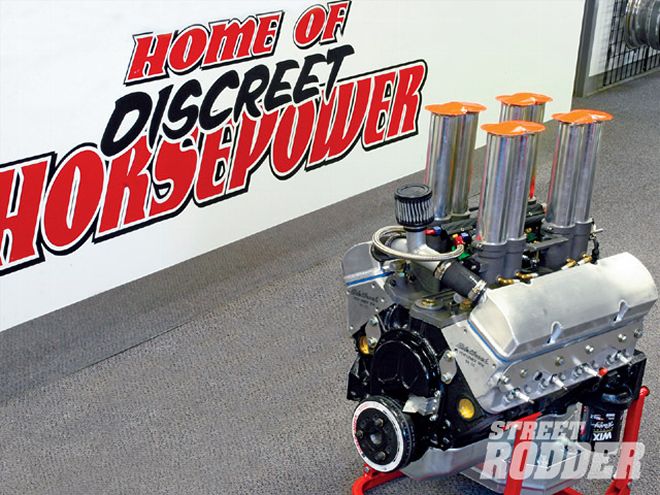
Unless you spend your weekends turning left on banked dirt, you've probably never heard of JR Motorsports. It's a mail-order retailer based in Ankeny, Iowa, a speck among the corn and soybeans north of Des Moines until urban sprawl found it a few years ago. The company caters largely to racers in the International Motor Contest Association (IMCA) series, but beyond selling others' parts, it manufactures its own. Among those parts is a line of spec engine packages for every class in the series, and the company sells about a thousand of them annually.
By selling every link in the chain that makes a racecar, the company has a unique perspective: it knows how each piece relates to the others around it. Due to this radiator-to-rear end perspective, JR Motorsports has earned a reputation as an authority by helping racers tune their cars as systems rather than collections of parts.
If you've ever built an engine or car piecemeal only to have it not perform as well as you anticipated, that last sentence probably caught your attention. If that's the case, so will this one: JR Motorsports recently took its holistic approach to racecar drivetrain design and applied it to road-going cars.
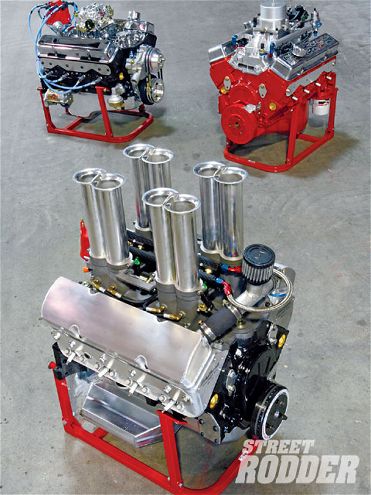 Clockwise from the left rear is the JR Motorsports engine trifecta: the Classic 350, Stage I, and Stage II. With a reconditioned block, crank, and rods, cast pistons, mild cam, either new or used GM heads, and a carburetor, the Classic 350 produces 330 horsepower and has a torque curve as flat as, well...Iowa. The Stage I engines like the one at the top right typically feature longer strokes, aftermarket cylinder heads, and forged pistons, but no two are exactly alike on account of the engine's intended application and induction system (this one's port injected). They're basically higher-output semi-custom offerings. The Hilborn-injected engine in the foreground is typical of a Stage II in the sense that it's unique to itself. It's a 500-horse long-rod stroker for a McLaren racecar that sees equal time on the street and at vintage-racing events.
Clockwise from the left rear is the JR Motorsports engine trifecta: the Classic 350, Stage I, and Stage II. With a reconditioned block, crank, and rods, cast pistons, mild cam, either new or used GM heads, and a carburetor, the Classic 350 produces 330 horsepower and has a torque curve as flat as, well...Iowa. The Stage I engines like the one at the top right typically feature longer strokes, aftermarket cylinder heads, and forged pistons, but no two are exactly alike on account of the engine's intended application and induction system (this one's port injected). They're basically higher-output semi-custom offerings. The Hilborn-injected engine in the foreground is typical of a Stage II in the sense that it's unique to itself. It's a 500-horse long-rod stroker for a McLaren racecar that sees equal time on the street and at vintage-racing events.
The company builds all brands whether big or small-block, but the flagship among them is a three-engine Chevrolet series: a near-stock 330-horsepower called the Classic; another semi-custom mill with aftermarket components including cylinder heads, forged pistons, and greater cam timing that the company calls the Stage I; and yet another built to very high displacement and horsepower levels-basically a race engine with race-duty parts tuned to run on pump gas-dubbed Stage II.
The company promotes these engines by referring to them as crate packages, but it's a term that does the company's scope a bit of a disservice. It goes back to the company's systemic approach: whereas the average crate engine is built to a generic standard that will serve most applications well, JR Motorsports will tailor an engine to match its intended purpose exactly. It's basically the best of two worlds: the rapid turnaround of a mass producer and the versatility of a custom engine builder.
Though it may seem a minor point, what makes the company excel is its ability to address other points in the chain that makes a car, items that often trip up even seasoned builders. Take something as simple as a Chevrolet flex plate: with 168 or 153 tooth counts, internal or external balancing, and one or two-piece rear main seal options, that's a 7:1 chance of choosing the wrong part. Mismatch the pan and block and you could accidentally eliminate the dipstick.
It's sort of hand-holding service and it extends to areas seemingly not related to the engine. "We had one guy buy one of our Stage II engines," Customer Service Manager Axel Andreasen related. "Even though it made 500 horsepower, he was really disappointed with the way the car performed. As it turned out, he had tall tires on a '70s Lincoln axle with a really high gear in it and the wrong converter. So we sold him a ring and pinion and a converter based on the tires, the transmission, the engine, and so on, and the car came to life-he was ecstatic."
The company's thrust is along the lines of the power package programs pioneered by various engine component manufacturers within the last decade. In them, the companies' engineers and tuners refined specific combinations of camshafts, heads, manifolds, and carburetors. By purchasing these sets as matched kits, anyone who knew nothing more than their way around a torque wrench was assured a particular power level. It's a systematic approach that revolutionized engine performance.
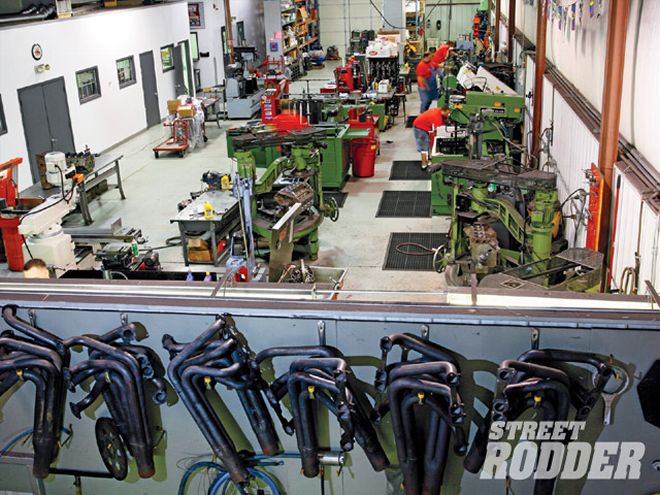 The machine shop constitutes a fair amount of JR Motorsports' 20,000-plus footprint. It houses every piece of equipment necessary to machine components, giving the company ultimate control over every step of the assembly process. From machining the components go to the clean rooms to the left for assembly. From there, each engine visits the dyno room (below). The headers on the wall represent those in each racing class for which the company builds engines.
The machine shop constitutes a fair amount of JR Motorsports' 20,000-plus footprint. It houses every piece of equipment necessary to machine components, giving the company ultimate control over every step of the assembly process. From machining the components go to the clean rooms to the left for assembly. From there, each engine visits the dyno room (below). The headers on the wall represent those in each racing class for which the company builds engines.
In a sense what JR Motorsports did isn't original; it just thought along the lines of the power package system and projected it right down the driveshaft to the pavement. Though admittedly not original, it's certainly not irrelevant; by thinking of a whole car as a system, JR Motorsports will likely revolutionize vehicle performance.
Where The Road And The Racetrack MeetBuilders who tune engines to run on racetracks and engines intended to run on the road are seldom matches made in heaven, but this one is. It's because the majority of engines that JR Motorsports builds compete in IMCA-series classes.
Many of the engines in those classes aren't very different than the ones we build for our street cars. Class rules mandate production blocks, heads, cranks, and rods. Claimer rules (where a competitor can buy or "claim" a competitor's engine for a fee far lower than an engine's replacement cost) take the incentive out of using exotic parts.
But there are differences. Fundamental among those that JR Performance builds for the track and street is tolerance. For example, race engines favor looser bearing, piston, and ring clearances to make the most power; street engines favor tight tolerances for longevity.
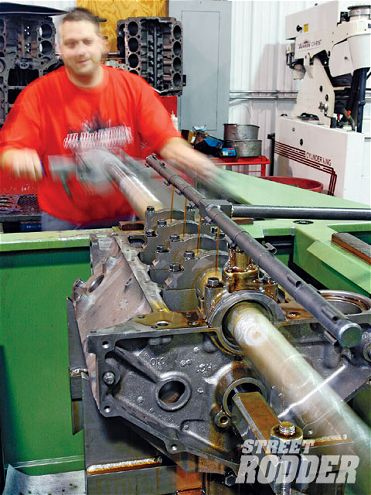 Though seen as a luxury by most volume engine builders and practically unheard of among crate engine providers, JR Motorsports justifies line honing in several ways. Volume brings cost down, the precision the process yields is cheap insurance against needless comebacks, and every cam installed on the premises gets degreed, anyway.
Though seen as a luxury by most volume engine builders and practically unheard of among crate engine providers, JR Motorsports justifies line honing in several ways. Volume brings cost down, the precision the process yields is cheap insurance against needless comebacks, and every cam installed on the premises gets degreed, anyway.
There are more differences for sure, but the similarities are overwhelming. For starters, many of these race engines have compression ratios low enough to run on pump gas. Limited induction systems (many classes mandate an OEM cast-iron manifold, many of them two-barrel) mean that tuners shoot for broad torque bands rather than peak horsepower. That's where a company like JR Motorsports shines: many of the race engines it tunes thrive in about the same conditions that the average road-car engine sees.
Customer Service
Whether it's in a cockpit, under a hood, at a machine, or behind a dyno, each member of the JR Motorsports crew brings a career's worth of experience. The company sure knows it; more than forthcoming, it showcases its staff. Call to order a part or ask a question, and you'll get both the first and last name. Leaf through a catalog and you'll eventually meet the people on the other end of that line. More than once a racer has asked a specific question only to end up talking to the guy he rubs fenders with on a weekly basis (out of the company's 35 people, 11 compete).
Say what you will about motive, but a photo and name of an employee printed in a company's literature speaks of a certain type of reliability and consistency-a company wouldn't likely commit to immortalizing its staff in print if it knew they wouldn't last a catalog's lifespan. "We look for people who have actual experience with the stuff we sell," co-owner Dave Johnson said. And when it finds them, it gives them an incentive to stay. Shop manager Dan Nikkel, for example, has been with the company since it opened its doors a decade ago. Customer service manager Axel Andreasen, who has decades of hands-on building and tuning experience in the racing industry, has been there just about as long.